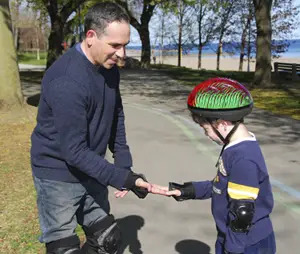You Can Do It!
We asked child experts in Manhattan for their best advice on how to instill and cultivate self confidence in children.

Experts agree that self-confidence is one of the most important contributors to good mental health for any individual, and the earlier you instill this trait in your child, the better his chance of success in many areas of life.
In addition to setting a good example for your child, one of the keys to fostering self-confidence is to genuinely support your child’s efforts-even if the outcome of those efforts is less than perfect. “If a child has worked hard, that should be acknowledged. That is what motivates children to keep trying,” says Siobhan Powers Streams, director of Landmark of Ridgefield Academy in Westport, CT. It’s important to keep in mind, though, that encouragement and flattery are two different things, and the latter can actually harm your child’s self-confidence in the long run.
“I believe that encouragement, rather than praise, is most helpful in developing healthy self-esteem in children,” Powers Streams says. “Praise is evaluative and teaches the child to seek the approval of others, while encouragement teaches the child to value herself and the efforts that she makes. As a parent, your goal is to help your child develop the confidence and sense of competence that will allow her to make good decisions and not need the approval of others.”
Read on for more advice from local experts on how to instill and cultivate self-confidence in your child.
What is your best advice for raising self-confident children?
“Children can be naturally self-confident if given the right environment. Nurturing a child’s right to their opinion is a great start. Parents can help cultivate self-confidence through supporting their child’s freedom of expression.
We believe in the ‘more praise the better’ philosophy, as long as it’s sincere (because children do know the difference). Children can be well served by knowing frequently and often that what they are doing is good, and they will learn to take pride in their work when given a simple acknowledgement for their efforts.”
-Laura Brown, director, DramaZone, with locations throughout NYC
“I believe it is very important to give verbal and nonverbal messages to children on how important they are and to let them know that their hard work is acknowledged. You can give kids confidence by expressing praise in a non-boastful way towards something they are passionate about, which gives them the chance to excel further. Everyone needs that one person in their life to tell them they are good at something. Coaches, for example, should acknowledge their students’ talent or skill, so that they may develop self-confidence throughout other aspects of their life. Rewards should not be the means to an end, but hard work should never be overlooked. You would be surprised how little it takes to make a difference in someone’s life.”
-Lorelei Garrett, Operations Director, BumbleBee Tennis
“Self-image is the single most important factor in the development of mentally healthy children. It also plays a large role in their achievements and interpersonal relationships.
When they’re very young, children’s self-esteem depends on their perceptions-on how they are being judged and valued by the important adults in their lives. Young children are unlikely to have their self-esteem grow stronger from excessive praise or flattery; on the contrary, it may raise some doubts in children and subsequently cause them to mistrust that person. Young children are more likely to benefit from tasks and activities that offer a real challenge, and earn them real appreciation, rather than fun activities that are rewarded with superficial praise.
To help them establish healthy self-esteem, treat children with respect, ask their views and opinions, and give them meaningful and realistic feedback. You can also help your child develop and maintain healthy self-esteem by helping him cope with defeats rather than emphasizing constant successes.
As they grow older, children become increasingly sensitive to feedback from their peers. You can help your child maintain self-confidence during this difficult time by being supportive of her values, accepting her when others may not, and encouraging her to keep an open mind about experiences outside the home.”
-Marina Doulova, MD, child & adolescent psychiatrist, director of ABC Psychiatric Services, Forest Hills
| Also see: More practical parenting advice from experts in the New York metro area, on topics like birthday parties, back to school, and sports. |





















